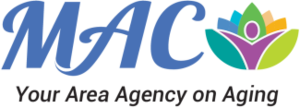Guardianship
Adult public guardianship is a legal procedure in which a court determines that a person has severe disabilities which:
- impair the person’s ability to make decisions
- require that the person is in need of protection
- there is no less restrictive alternative
The executive director of the Area Agency on Aging can be appointed the guardian of such a person, as the guardian of last resort. The guardian makes decisions for the person including living arrangements, medical care, physicians, associations (who visits or takes them on outings), etc.
Eligibility:
- Age 65 and older.
- Determined by the courts to be incompetent.
Why Guardianship
A person exhibits an inability to make every-day decisions because of:
- Effects of disease or disabling condition (stroke, Alzheimer’s disease, etc)
- Mentally confused or forgetful
- Inability to manage money or business affairs
- Inability to meet physical needs
Alternatives to Guardianship
- Voluntarily make a change. For example, a person living alone agrees to leave home and live with relatives or in an assisted living facility
- Take a friend or relative to medical appointments
- Retain a case manager to coordinate services so the person maintains the highest level of self-sufficiency
- Attend adult medical day care. This provides a safe place during the day with companionship, activities, lunch and medical oversight, if needed.
- Sign up for Meals on Wheels if homebound
- Groceries and prescriptions can be delivered
- Ask the pharmacy to organize medications into blister packs, or purchase a dispenser
- Join the telephone reassurance program. This program calls homebound individuals daily to make sure they are safe and well.
- Obtain a Life Alert (or similar) device in case of falls or other emergencies
- Notify the utility companies so that a third party is notified if the bill is not paid
- Arrange for direct deposit of any income
- Pay bills with an auto-pay feature through your bank
- Add a joint owner to your bank account (a trusted individual)
- Create a Power Of Attorney
- Create an advance directive for medical care
- Listen to professionals if they advise that you need assistance, or to not live alone.

